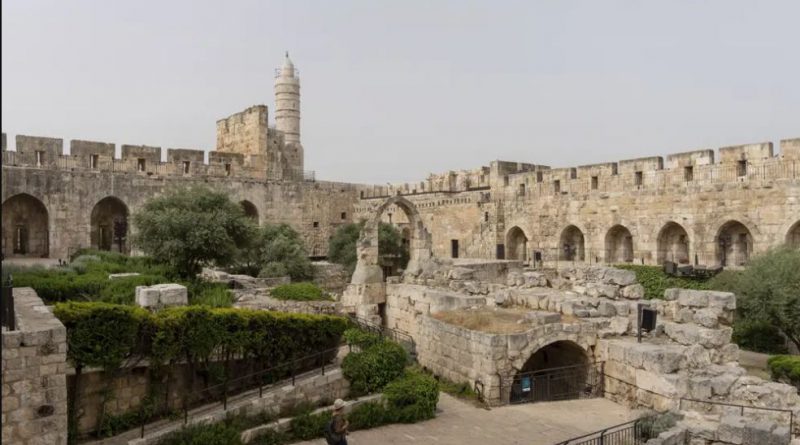Jerusalem’s redesigned Tower of David museum opens after 3-year renovation
Associated Press
Today, the former castle serves as a museum dedicated to the city’s 3,000-year history.
Jerusalem’s iconic citadel has opened its revamped museum after a three-year, $50 million makeover that included a restoration of its signature minaret.
The Tower of David, the ancient fortress on the western edge of the Old City, contains remnants of successive fortifications built one atop the other dating back over two millennia. For centuries, pilgrims, conquerors and tourists visiting the city holy to Judaism, Christianity and Islam have entered Jerusalem beneath the adjacent Jaffa Gate.
Today, the former castle serves as a museum dedicated to the city’s 3,000-year history.
It is a daunting task for a museum condensed into around 11,000 square feet (1,000 square meters) of gallery space, particularly due to its location in the Old City, the focal point of the decades-long Israeli-Palestinian conflict. In a city of dueling narratives, the museum clearly veers toward the Israeli perspective.
The museum launched its overhaul in the midst of the 2020 coronavirus pandemic, when foreign tourists could not enter Israel and visitor numbers had plummeted.
The project included archaeological excavations, rewiring, restoration and installation of new exhibits. The signature 400-year-old minaret underwent an extensive restoration to preserve its structural integrity.
The new entrance pavilion nearing completion realigns the museum’s flow from the plaza outside the Jaffa Gate through the castle’s interior, making the museum a “gateway to Jerusalem,” said Eilat Lieber, the museum’s director.
The museum’s ambitious new permanent exhibitions — mixing multimedia displays with artifacts — have advanced the visitor experience to the 21st century, while a restored late 19th-century scale model of Jerusalem designed for the 1873 Vienna World’s Fair adds some throwback flair.
Exhibits focus on themes of the city’s long history, rather than any detailed traipse through Jerusalem’s many centuries of successive conquest, occupation, destruction and reconstruction.
The Tower of David strives to be “an inclusive museum,” said Lieber.
It has exhibits explaining Jerusalem’s significance to the three monotheistic faiths whose followers have prayed and shed each others’ blood here over successive centuries.
An audio-visual presentation captures the annual cycle of Jewish, Christian and Muslim holidays, and there are scale models of the ancient Jewish Temple, the Church of the Holy Sepulcher and the golden Dome of the Rock.
“People from all over the world … would find their own narrative here in this museum,” she said.
But the museum occasionally struggles in addressing the vastly rival narratives of Israelis and Palestinians.
It makes scant mention of Jordan’s control of east Jerusalem, including the Old City, from 1949 until Israel captured it in the 1967 Mideast war.
The national identity of the Palestinians, who make up around one-third of the city’s population, is barely addressed.
In one exhibit they are referred to as “Arabs of East Jerusalem.”
The Israel-Palestinian conflict is referred to in passing, with no mention of the violence that has wracked Jerusalem in recent decades, much of it just a few hundred meters (yards) from the museum.
Israel annexed east Jerusalem after the 1967 war, a step that is not internationally recognized, and considers the entire city its capital. The Palestinians seek east Jerusalem as capital of a future state.
Lieber said the museum consulted with top academic experts and religious leaders from all faiths during the renovation, but also noted it is still an Israeli public institution and acknowledged that history is “not objective.”



